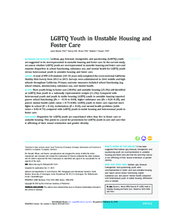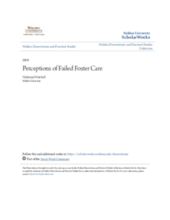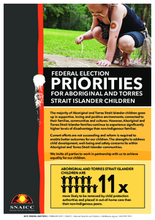Displaying 931 - 940 of 2221
This study explores the lived experience of child welfare worker turnover from the child's perspective, adding an important and underrepresented voice in the literature.
This study assesses whether LGBTQ youth are overrepresented in unstable housing and foster care and examines disparities in school functioning, substance use, and mental health for LGBTQ youth versus heterosexual youth in unstable housing and foster care.
The purpose of this action research study was to investigate social workers’ perceptions of the problems that prevent successful family reunifications after foster care. The study explored social workers’ perceptions of barriers that prevent family reunifications in central Mississippi, USA.
In Wales, a significant body of work has been produced on and with care-experienced children and young people. This edited collection attempts to highlight these valuable insights in a single volume.
This brief from SNAICC – National Voice for our Children highlights the issue of the disproportional numbers of Aboriginal and Torres Strait Islander children in out-of-home care in Australia, which has reached "national crisis proportions," and outlines key steps that need to be taken to address this issue.
In this exploratory study, through use of an online anonymous survey, local county child welfare caseworkers were asked to self-rate their knowledge of, exposure to, and comfort levels with children with developmental disabilities.
This study examined the effect of privatization policy on the issue of racial disparity in the child welfare system.
This report turns the lens on young people who age out of foster care and explores four areas — education, early parenthood, homelessness and incarceration — where they fare worse than their general population peers in the US.
In this webinar presented by RISE Learning Network, Omattie Madray and Zenainda Rosales presented an extensive study recently carried out which analyzed over 100 documents and conducted over 20 interviews to gain insights on practices of organizations supporting and caring for boys affected by sexual violence in their recovery process.
Using a two-study design, this study tests whether sexual minority youth are overrepresented in child welfare, foster care, and out-of-home placement using nationally representative data from the United States.




